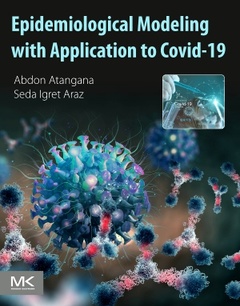Epidemiological Modeling with Application to Covid-19
Langue : Anglais
Auteurs : Atangana Abdon, Araz Seda İğret

Epidemiological Modeling with Application to Covid-19 presents information about statistical, numerical, stability, and theoretical analyses for nine different Covid-19 models. Those models are considered with classical and fractional derivatives, which is a generalization of the classical analysis. The authors present their newly introduced rate indicator function for the prediction of the waves of Covid-19 spread. Moreover, future prediction of Covid-19 spread is presented for some countries. The authors also provide a new approach to modeling epidemiological issues in general, which has been tested against the spread of COVID-19 in several nations.
This book provides in-depth analysis of the spread of Covid-19, including discussion of theoretical and numerical results, including a novel modeling method called strength numbers that was created under the umbrella of acceleration, which provides a determiner of the power of disease spread. These significant characteristics might be the key to understanding and anticipating the spread of infections and diseases more generally.
This book provides in-depth analysis of the spread of Covid-19, including discussion of theoretical and numerical results, including a novel modeling method called strength numbers that was created under the umbrella of acceleration, which provides a determiner of the power of disease spread. These significant characteristics might be the key to understanding and anticipating the spread of infections and diseases more generally.
1. History and Data Collection of Covid-19
2. Statistical Analysis of Collected Data
3. Nonlocal Operators and Their Properties
4. A New Mathematical Model of Covid-19 Spread with 9 Classes: Application to Cameroon Case
5. A SCIRD Mathematical Model of Covid-19 Spread with A Lockdown Functions Applications to Russia Case
6. Mathematical Model of Covid-19 Spread with Super-spreaders and Hospitalized Classes: Application to South Africa Case
7. A Covid-19 Spread Model with Two Stages Piecewise Lockdown Function: Application to Turkey case
8. A SEIARP Model of Covid-19: Application to Italy Case
9. A SEIAQPHR Model of Coronavirus Transmission: Application to Ukraine Case
10. A Mathematical Model with Exposed and Quarantined Classes: Application to Nigeria Case
11. Mathematical Model of Covid-19 Transmission Including a Closely Observed Population: Application to Morocco Case
12. A New Mathematical Model with Two Susceptible and Two Infected Classes: Application to Azerbaijan Case
2. Statistical Analysis of Collected Data
3. Nonlocal Operators and Their Properties
4. A New Mathematical Model of Covid-19 Spread with 9 Classes: Application to Cameroon Case
5. A SCIRD Mathematical Model of Covid-19 Spread with A Lockdown Functions Applications to Russia Case
6. Mathematical Model of Covid-19 Spread with Super-spreaders and Hospitalized Classes: Application to South Africa Case
7. A Covid-19 Spread Model with Two Stages Piecewise Lockdown Function: Application to Turkey case
8. A SEIARP Model of Covid-19: Application to Italy Case
9. A SEIAQPHR Model of Coronavirus Transmission: Application to Ukraine Case
10. A Mathematical Model with Exposed and Quarantined Classes: Application to Nigeria Case
11. Mathematical Model of Covid-19 Transmission Including a Closely Observed Population: Application to Morocco Case
12. A New Mathematical Model with Two Susceptible and Two Infected Classes: Application to Azerbaijan Case
Dr. Abdon Atangana is Academic Head of Department and Professor of Applied Mathematics at the University of the Free State, Bloemfontein, Republic of South Africa. He obtained his honours and master’s degrees from the Department of Applied Mathematics at the UFS with distinction. He obtained his PhD in applied mathematics from the Institute for Groundwater Studies. He was included in the 2019 (Maths), 2020 (Cross-field) and the 2021 (Maths) Clarivate Web of Science lists of the World's top 1% scientists, and he was awarded The World Academy of Sciences (TWAS) inaugural Mohammed A. Hamdan award for contributions to science in developing countries. In 2018 Dr. Atangana was elected as a member of the African Academy of Sciences and in 2021 a member of The World Academy of Sciences. He also ranked number one in the world in mathematics, number 186 in the world in all fields, and number one in Africa in all fields, according to the Stanford University list of top 2% scientists in the world. He was one of the first recipients of the Obada Award in 2018. Dr. Atangana published a paper that was ranked by Clarivate in 2017 as the most cited mathematics paper in the world. Dr. Atangana serves as an editor for 20 international journals, lead guest editor for 10 journals, and is also a reviewer of more than 200 international accredited journals. His research interests include methods and applications of partial and ordinary differential equations, fractional differential equations, perturbation methods, asymptotic methods, iterative methods, and groundwater modelling. Dr. Atangana is a pioneer in research on fractional calculus with non-local and non-singular kernels popular in applied mathematics today. He is the author of numerous books, including Integral Transforms and Engineering: Theory, Methods, and Applications, Taylor and Francis/CRC Press; Numerical Methods for Fractal-Fractional Differential Equations and Engineering: Simulations and Modeling, Taylor and Francis/CRC
- Provides in-depth analysis of the spread of Covid-19, including discussion of theoretical and numerical results
- Introduces a new concept called the rate indicator function for a new perspective on the spread of virological disease in epidemiology
- Presents a novel modeling method called strength numbers created under the umbrella of acceleration, which provides a determiner of the power of disease spread
- Provides a new approach to developing mathematical equations that may be used to show how an infectious disease spreads using the available starting data
Date de parution : 09-2024
Ouvrage de 400 p.
Thèmes d’Epidemiological Modeling with Application to Covid-19 :
© 2024 LAVOISIER S.A.S.
